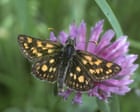Event JSON
{
"id": "b7745db855bb38a277541722e30ffbaca28953cf1b9ea23ae6d48ba37313b98f",
"pubkey": "9d3345095e986ded9af724d26a8c5bee050bfd615c32fc5e76981a089c72008e",
"created_at": 1746782443,
"kind": 1,
"tags": [
[
"r",
"https://www.theguardian.com/environment/2025/may/09/midsummer-butterlies-spotted-early-in-britain-after-sunny-spring"
],
[
"subject",
"Midsummer butterflies spotted early in Britain after sunny spring"
],
[
"published_at",
"1746781497"
],
[
"image",
"https://i.guim.co.uk/img/media/b1a8b76e5495956cf21a72671af7075bc3e14fc0/16_0_4405_3525/master/4405.jpg?width=140\u0026quality=85\u0026auto=format\u0026fit=max\u0026s=2940576abf61dacb1e13c3dfd6836ee2"
],
[
"p",
"9d3345095e986ded9af724d26a8c5bee050bfd615c32fc5e76981a089c72008e",
"wss://articles.layer3.news"
],
[
"imeta",
"url https://i.guim.co.uk/img/media/b1a8b76e5495956cf21a72671af7075bc3e14fc0/16_0_4405_3525/master/4405.jpg?width=140\u0026quality=85\u0026auto=format\u0026fit=max\u0026s=2940576abf61dacb1e13c3dfd6836ee2"
],
[
"t",
"liberal:perspective"
],
[
"summary",
"The early emergence of butterflies is attributed to the prolonged sunny and dry spring, which has caused a significant shift in the typical emergence patterns of various species. While some species, like the chequered skipper, have adapted to the change, others may struggle to find food and avoid predators. Butterfly experts are concerned about the potential decoupling of species from their natural habitats and the impact of climate change on their populations."
]
],
"content": "nostr:nprofile1qyd8wumn8ghj7ctjw35kxmr9wvhxcctev4erxtnwv4mhxqpqn5e52z27npk7mxhhynfx4rzmaczshltptse0chnknqdq38rjqz8q3cttcd\nhttps://i.guim.co.uk/img/media/b1a8b76e5495956cf21a72671af7075bc3e14fc0/16_0_4405_3525/master/4405.jpg?width=140\u0026quality=85\u0026auto=format\u0026fit=max\u0026s=2940576abf61dacb1e13c3dfd6836ee2\nScientists fear early emerging insects may fall out of sync with pathogens, predators or availability of foodMidsummer butterflies are on the wing in early May after a sunny spring sparked one of the most advanced seasons for Britain’s Lepidoptera on record.The Lulworth skipper – usually found in June and July – is flying at Lulworth Cove in Dorset, the chequered skipper emerged in April rather than mid-May in Scotland and the first swallowtail, which is commonest in mid-June, was spotted in Norfolk on 1 May. Continue reading...\nhttps://www.theguardian.com/environment/2025/may/09/midsummer-butterlies-spotted-early-in-britain-after-sunny-spring",
"sig": "c08a0ddd508505acd114e24586d893dcf2a553f6b0bf4f712df0c15c6ac6e71c15df6b0c01496887b73a48d51ff9ee60f70578b17efa45865c7aba41adb53cab"
}

